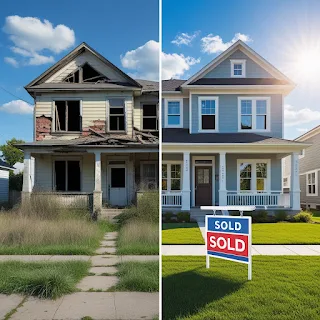Flip Houses Like a Pro: Your Ultimate Guide to Real Estate Success
Flip Houses Like a Pro: Your Ultimate Guide to Real Estate Success
 |
| See the incredible transformation of a fixer-upper into a beautiful, move-in-ready home — the power of house flipping! |
Have you ever dreamed of turning a run-down house into a beautiful, profitable property? Imagine buying a fixer-upper, adding your personal touch, and selling it for a big profit. That’s the power of flipping houses—and you don’t need to be a millionaire or a construction expert to get started.
This blog post is your step-by-step guide to flip houses like a pro, even if you’re a beginner. We’ll cover what house flipping is, how to do it successfully, and the common mistakes to avoid. Whether you’re looking to build wealth, escape the 9-to-5 grind, or simply learn a new skill, this guide is for you.
What Is House Flipping?
House flipping is the process of buying a property (usually below market value), fixing it up, and selling it quickly for a profit. It’s one of the most popular real estate strategies—and for good reason. When done right, flipping can offer high returns in a short period of time.
But flipping isn’t just about buying low and selling high. It takes planning, smart investing, and knowing the market. The good news? With the right knowledge, you can do it too.
Why Flipping Houses Is a Smart Investment
Here’s why more people are jumping into house flipping:
High profit potential – A single successful flip can earn tens of thousands of dollars.
Low barrier to entry – You don’t need a license to start flipping homes.
Flexible lifestyle – Be your own boss and work on your own terms.
Creative outlet – Turn old, neglected homes into stunning properties.
Long-term wealth building – Many flippers turn it into a full-time business or grow into rental income.
How to Flip Houses Like a Pro (Step-by-Step)
Step 1: Understand the Market
Before anything else, study your local real estate market. Look for:
Up-and-coming neighborhoods
Areas with job growth, good schools, and low crime
What types of homes are selling quickly
The average price and condition of sold homes
Pro Tip: Use free tools like Zillow, Redfin, or local MLS listings to track trends.
Step 2: Set a Realistic Budget
Budgeting is key. Plan for:
Purchase price
Renovation costs
Closing costs
Property taxes and insurance
Marketing and selling fees
A buffer for unexpected expenses (always expect surprises)
Step 3: Find the Right Property
Look for undervalued or distressed properties. Great places to find deals:
Foreclosure auctions
Bank-owned homes (REOs)
Off-market leads
Real estate wholesalers
Networking with agents and investors
Important: Don’t buy with emotion. Run the numbers and stick to your budget.
Step 4: Analyze the Deal (Use the 70% Rule)
Here’s a basic formula flippers use:
Maximum Purchase Price = (ARV x 70%) – Estimated Repair Costs
ARV = After Repair Value (what the house will sell for after renovations)
This formula helps ensure you leave room for both renovation costs and profit.
Step 5: Secure Your Financing
You don’t always need to pay all cash. Here are financing options:
Hard money lenders – Fast but with higher interest
Private investors – Family, friends, or business partners
Bank loans or HELOCs – If you have strong credit
Partnerships – Split profits with someone who has capital
Step 6: Renovate with Purpose
Focus on improvements that add value:
Kitchen and bathroom updates
New flooring and fresh paint
Curb appeal (landscaping, exterior repairs)
Fixing major issues (roof, plumbing, HVAC)
Avoid over-improving. You’re not building a dream home—you’re making it market-ready.
Step 7: Sell Smart
Work with a skilled real estate agent or use online platforms to market your home. Make sure to:
Stage the property professionally
Use high-quality photos and videos
Highlight upgrades and features in your listing
Price competitively to attract offers fast
Time is money—the longer a home sits unsold, the more it costs you.
Tips from Successful House Flippers
Start small and learn before scaling up
Build a strong team: contractor, realtor, inspector, lender
Always expect delays or surprises
Don’t cut corners on major repairs
Keep learning from books, podcasts, and mentors
Common Mistakes to Avoid
Paying too much for the property
Underestimating repair costs
Skipping inspections
DIY everything (know when to hire pros)
Not having a backup plan
Is Flipping Right for You?
Flipping houses isn’t just for TV stars or big-time investors. With dedication, smart planning, and a willingness to learn, you can create real income and build long-term success. It’s not always easy—but it can absolutely be worth it.
So if you’re tired of watching others succeed and ready to take control of your financial future, maybe it’s time to flip your first house.
Final Words: Your Future Starts Now
Every expert flipper started as a beginner—just like you. The difference is, they took the first step.
So what are you waiting for? Learn. Plan. Take action. Flip houses like a pro—and create the life you’ve always wanted.



Comments
Post a Comment